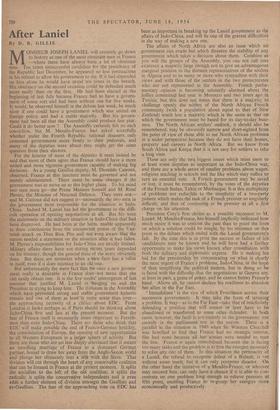By D. R. GILLIE been as important in breaking up
the Laniel goyernment as the affairs of Indo-China, and will be one of the gravest difficulties in the way of making a new one.
The affairs of North Africa are also an issue which no government can evade but which threaten the stability of any government which takes a decision about them. Combine as you will the groups of the Assembly, you can not call into existence a majority large enough not to give an advantageous marginal position to the thirteen representatives of the settlers in Algeria and to as many or more who sympathise with their views and with those of the settlers'in the two protectorates who are not represented in the Assembly. French parlia- mentary opinion is becoming salutarily alarmed about the follies committed last year in Morocco and two years ago in Tunisia, but this does not mean that there is a majority to challenge openly the wishes of the North African French community (with a population about equal to that of New Zealand) much less a majority which is the same as that on which the government must be based for its day-to-day busi- ness. The North African settlers' outlook, it should also be remembered, may be obviously narrow and short-sighted from the point of view of those able to see North African problems in a wider perspective because they do not have their homes, property and careers in North Africa. But we know from South Africa and Kenya that it is not easy for settlers to take a long view.
These are only- the twq biggest issues which must seem to at least some deputies as important as the Indo-China war, and there are a whole series of smaller problems about wages, religious teaching in schools and the like which may suffice to turn an essential vote. A French government may be saved or lost, it must be remembered, by the votes of the deputies of the French Sudan, Tahiti or Martinique. It is this multiplicity of problems not reducible to the simplicity of a two-party pattern which makes the task of a French premier so singularly difficult, and that of continuing to be premier at all a first charge on his attention.
President Coty's first choice as a possible successor to M. Laniel, M. Mendes-France, has himself implicitly indicated how much easier it was to criticise the past than to point the lines on which a solution could be sought, by his reticence on this point in the debate which ended with the Laniel government's fall: By the time this is in print the success or failure of his candidature may be known and he will have had a further opportunity to make his views known after consultation with both the military and diplomatic experts. He is making his bid for the premiership by concentrating on what is clearly the most urgent of France's problems, Indo-China, in the hope of thus simplifying the political pattern, but in doing so he is faced with the difficulty that the negotiations at Geneva are, at least in part, a game of poker, and he cannot betray France's hand. Above all, he cannot declare his readiness to abandon her allies in the Far East.


















































 Previous page
Previous page